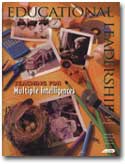The American School Superintendent
The American School Superintendent: Leading in an Age of Pressure by Gene R. Carter and William G. Cunningham. San Francisco: Jossey-Bass, 1997.
Those who aspire to become school superintendents will find this book thoughtful and informative, if daunting in its clearheaded look at the job. In the preface, Cunningham and ASCD's own Gene Carter, who was superintendent of Norfolk public schools for nine years, refer to their participation in a five-year Danforth Foundation School Administration Fellowship Program. They note that of the 50 superintendents in the program, only two remained on their job one year after this program ended.
Those who are already superintendents will be too busy to read the book—they are living it. Their words, quoted in case studies, bring to life the conflicts they face. Indeed, the book constitutes an excellent overview of those pressures. The book is a summary of our lives and times in public education.
Sooner or later all the pressures find their way to the desk of the superintendent. As he or she works with the staff, the public, the school board, and "the countless interest and pressure groups," the superintendent must walk a tightrope. As the authors explain it, "a major responsibility is to deal with conflicting expectations, multiple political agendas, and varying ideas without unduly creating enemies or distrust." The danger is that "the superintendency can crumble from the outside or from the inside." And once "communication and cohesion break down" and the superintendent can no longer manage the pressures, public dissatisfaction ensues, "which typically ends with the superintendent's being fired."
Truly it seems that superintendents take their jobs on a dare. The greater the number of constituents who have input into the selection of a new superintendent, the more that person operates with the unspoken threat that he or she can be replaced if each pressure group doesn't get what it wants.
The authors don't leave readers feeling helpless, however. They offer helpful "responses and remedies" and share their vision of "new directions and responsibilities." Their recommendations range from the visionary world views of writers such as Peter Senge and Margaret Wheatley to the exhortations of business and policy leaders who have more or less dictated school reform for the past 15 years. They provide an excellent assessment of the superintendent's role in communications and a well-informed summary of technology's potential for school systems.
For readers who already have serious concerns about the future of public education, this book offers little cause for optimism. The references to short tenure remind us that even visionary efforts and the popular reform agenda did not work for those superintendents. Aspiring superintendents would be wise to consider also Public Agenda's work on school governance. That organization has documented dramatically that America's teachers, parents, and citizens hold opinions very different from the typical reform agenda and from most of the brave-new-world concepts of visionary thinkers, however exciting their ideas may be to those of us in the profession.
In their examination of the superintendency, Carter and Cunningham have made a substantial contribution to understanding the status of American schools and what we need for the future.
Published by Jossey-Bass Publisher Inc., 350 Sansome St., San Francisco, CA 94104. Price: $29.95.
—Reviewed by Anne Meek, Senior Program Specialist, Education Statistics Services Institute, Washington, D.C.
City Kids, City Teachers
City Kids, City Teachers. William Ayers and Patricia Ford, editors. New York: The New Press, 1996.
Writings in this salute to city kids and city teachers are united by a common thread—the belief that pejoratively labeled inner-city students possess unique experiences, knowledge, and skills that they, their families, and educators can tap as entry points to an urban pedagogy of excellence. The three-part collection begins with memoirs and essays by grown-up city kids. It then moves into the reflections of researchers, school reformers, and activists on such city issues as bilingual education, school culture, urban pedagogy, and Black English and concludes with inspiring accounts of successful city teachers. The book brings together excerpts from articles and literature by such leading writers in the field as Lisa Delpit, Martin Haberman, Constance Clayton, and Louanne Johnson.
Ayers, from the University of Illinois at Chicago, and Ford, a community organizer, are also codirectors of the Small Schools Workshop. They often address preservice and new teachers, urging them to "commit to a lifetime of learning, growing, developing...." But with its upbeat mix of ready-to-share city kids' memoirs, successful curriculums and classroom strategies, and advice from community members, this book is also an inspiring resource for veteran teachers, parents, community members, and students. Readers also will profit from the extensive bibliography of books, mixed media, and films.
Published by The New Press, 450 W. 41st St., New York, NY 10036. Price: $25.
—Reviewed by Rose Reissman, New York City Public Schools, Manhattan College, and Fordham University, New York.
